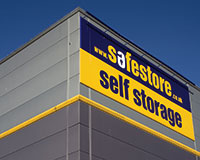 None of the UK listed sector’s property giants – not even the household names – saw its share price climb as much as Safestore’s in 2015.
None of the UK listed sector’s property giants – not even the household names – saw its share price climb as much as Safestore’s in 2015.
The self-storage provider was the darling of the investor community for a second year running in 2015. Its share price rose by 54.1%, making it many City analysts’ pick for the future.
The company is a shining light in an already successful sector, where income returns are becoming more of a focus than capital values.
Key to the company’s ability to outperform its peers was the appointment of Frederic Vecchioli as chief executive in 2013, replacing Peter Gowers.
The company was already a leader in the self-storage sector with a strong presence in Paris and the UK, including 41 wholly owned stores within the M25.
As a result, it was the number-two player in a growing market, behind Big Yellow. The board and its investors saw Safestore as a company with more scope for growth and Vecchioli as the man to generate it. He had previously been founder and head of the company’s French division for 17 years but now resides in London.
His strategy focused on increasing letting space within stores, rather than expanding the number of stores. It also reduced the number, and amount, of discounts that stores offered on lettings. Dramatic discounts, Vecchioli believes, were devaluing the product and putting customers off.
“The average volume of discounts in 2013 was around 23% and it then went to 7%. Lettings rose by 40% to 45% compared with 2013. Lettings were not achieved by giving away the product – just the opposite,” he says.
Vecchioli and his management team also saw a need to improve the technology facing customers and the training staff underwent.
With 80% of all enquiries being web-based and 50% of those from mobiles, a priority was to put the business at the top of search lists and to convert enquiries efficiently into new tenants.
The company made dramatic changes to its staffing and operations. “In my first year we changed about 70% of the operational team,” says Vecchioli, including changing the operations director.
This overhaul brought about new ideas, which were taken on board without unsettling the business, Vecchioli says.
Implementation of Safestore’s overall strategic plan is ongoing and will include some traditional real estate actions. There will be some refurbishment and reconditioning of stores as well as acquisitions of new sites with a target for the outskirts of London and Paris.
But Vecchioli says growth through acquisition is difficult in the current environment.
“It is very hard to develop a self-storage facility in London and almost impossible in Paris because planning makes it so difficult,” he says.
He adds that it is made more difficult by requiring sites with good retail characteristics. “I think we pay more than a typical industrial user would pay, but we don’t pay the price a retail buyer would,” he says.
Filling empty space is the number-one priority, however, with 1.3m sq ft in London and Paris vacant – 27.4% of the portfolio, which is around the industry average.
The driving force for the business remains income from its existing assets and making the use of space it already has more efficient.
Efficient use of capital – expenditure is around £3m pa – low debt and steady revenue have prompted predictions by banks including Jefferies and Investec of a third year of outperformance, making the company a safe place to store your money.










